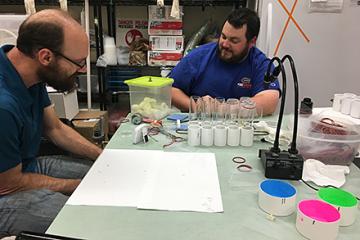The Ultimate Buzz Kill

Close-up under ultra-violet light of an irradiated male colony-reared Aedes aegypti mosquito that has been marked with green fluorescent pigment prior to release in the sterile insect technique (SIT) program. Males are later recaptured to determine survival, dispersal distance, and relative proportions among wild unmarked male mosquitoes – all factors that will help improve the SIT operation in later releases.
In comics and movies, radioactive insects have a habit of turning people into superheroes with a single bite. In real life, zapping insects with radiation can have a very different effect — one that might help the world much more than a webbed crusader. Ken Linthicum, center director at the ARS Center for Medical, Agricultural, and Veterinary Entomology in Gainesville, FL, has collaborated with scientists from the University of Florida and the Anastasia Mosquito Control District in St. Augustine, FL, to develop a new technique for using radiation to control mosquito populations, by sterilizing the males.
Linthicum hopes to use the technique on a specific type of mosquito that is particularly troublesome for humans. Aedes aegypti is notorious for spreading dengue virus, yellow fever virus, chikungunya virus, and Zika virus, among other ailments. While many mosquitoes do not feed on people, or even domestic animals, Ae. aegypti "targets humans, almost exclusively," said Linthicum. "It will feed on other things, but mostly, given a choice, it will feed on people. It likes to live with people. If you have any water around your house, this mosquito will live in that water. It will actually live inside houses if you have water there. It is also unique in that it occurs throughout the world, causing disease to millions of people."
Linthicum and his team's new technique combines radiation and specialized mosquito-rearing methods that he and his colleagues believe could be widely replicated and used in place of pesticides. Once released, sterile males mate with females, which then lay infertile eggs.

Technician J.D. Kline (left) and Dylan Tussey, University of Florida Ph.D. student, prepare to mark irradiated male colony-reared Aedes aegypti mosquitoes with fluorescent pigment. These sterilized male mosquitoes will be released to mate with wild females in a sterile insect technique (SIT) program.
"Every sterile male will compete with a natural male," Linthicum explained, "and if those mosquitoes we release are competitive, then you'll start to produce fewer mosquitoes in one cycle, and then the next cycle, when we start releasing, will reduce the population further. We realize, however, that the mosquitoes we produce are probably not as competitive as a wild mosquito in a natural habitat, so we try to release 7-10 times as many laboratory mosquitoes as males in the natural population."
The technique is not the first to leverage the power of sterilization, but it is the most effective. Previous techniques did not produce enough mosquitoes that were viable (able to reproduce), and were often complex and expensive to use. Linthicum's goal was to develop a technique that could be used easily by any mosquito control agency, and so far, things look promising: the technique has already been adopted by one district in Florida. Ideally, it would be used in conjunction with other mosquito control methods; one of the best approaches to suppress populations, Linthicum noted, is to eliminate standing, open water around human populations.
Ultimately, Linthicum would like to see his team's technique entirely eliminate Ae. aegypti and in the process, protect people from the dangerous diseases that it transmits. Those diseases are currently difficult to eradicate, because they are continuously re-introduced by people who have travelled abroad. As long as Ae. aegypti persists in the United States, it can transmit the diseases locally, spreading them even to people who have never left home. If Linthicum and his team succeed, however, they may be able to drastically reduce, or even destroy, the Ae. aegypti mosquito – and in doing so, protect Americans from a cluster of debilitating diseases.– Kathryn Markham, ARS Office of Communications
You May Also Like:

